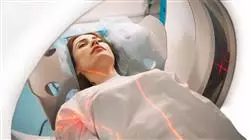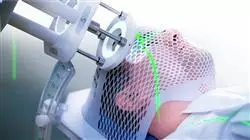University certificate
The world's largest faculty of nursing”
Introduction to the Program
You'll master the most advanced techniques for postoperative follow-up, all thanks to the world's best digital university, according to Forbes”

Within the framework of advanced Radiotherapy procedures, nurses play a key role when it comes to patient care. In most cases, these experts are responsible for communicating relevant information about treatments to users. For this reason, it is essential that they acquire a comprehensive approach to issues such as therapy goals, therapy planning and the ways in which radiation therapy is administered. In this context, these professionals need to broaden their knowledge in this area and be at the technological forefront to offer services based on healthcare excellence.
To help them with this specialization, TECH has implemented the most complete Postgraduate diploma in the market, to provide professionals with the most effective Radiotherapy techniques. In this way, the curriculum will delve into the specificities of Brachytherapy, so that graduates minimize irradiation of healthy tissues and perform administration techniques to combat diseases such as prostate cancer.
Likewise, they will delve into the handling of Mobile Linear Accelerators as well as intraoperative imaging systems. As a result, graduates will be highly qualified to participate in surgical procedures in Intraoperative Radiotherapy. The didactic materials will also focus on real-time monitoring during surgeries, which will make it possible to detect any change in the patients' conditions.
In this way, the academic program is based on a 100% online methodology, providing greater flexibility and convenience to the students. In addition, the Relearning teaching system, focused on the repetition of key concepts to fix knowledge, facilitating a solid and lasting learning, and avoiding the extra effort involved in memorization. In this sense, the only thing the specialist will need to enter the Virtual Campus will be an electronic device with Internet access.
You will acquire a broad knowledge of the Flash Technique, which will help you to provide quality emotional support to patients and their families"
This Postgraduate diploma in Radiophysics Applied to Advanced Radiotherapy Procedures contains the most complete and up-to-date scientific program on the market. The most important features include:
- The development of practical cases presented by experts in Radiophysics applied to Advanced Radiotherapy Procedures
- Graphic, schematic, and practical contents which provide scientific and practical information on the disciplines that are essential for professional practice
- Practical exercises where self-assessment can be used to improve learning
- Its special emphasis on innovative methodologies
- Theoretical lessons, questions to the expert, debate forums on controversial topics, and individual reflection assignments
- Content that is accessible from any fixed or portable device with an Internet connection
You will delve into the advances that have emerged in Protontherapy and will achieve high precision during treatments”
The program’s teaching staff includes professionals from the sector who contribute their work experience to this program, as well as renowned specialists from leading societies and prestigious universities.
The multimedia content, developed with the latest educational technology, will provide the professional with situated and contextual learning, i.e., a simulated environment that will provide immersive education programmed to learn in real situations.
This program is designed around Problem-Based Learning, whereby the professional must try to solve the different professional practice situations that arise during the academic year For this purpose, the students will be assisted by an innovative interactive video system created by renowned and experienced experts.
You will develop risk mitigation strategies to ensure the well-being of users during therapy sessions"

Based on the Relearning methodology, this university program will provide you with a flexible and effective learning experience"
Why study at TECH?
TECH is the world’s largest online university. With an impressive catalog of more than 14,000 university programs available in 11 languages, it is positioned as a leader in employability, with a 99% job placement rate. In addition, it relies on an enormous faculty of more than 6,000 professors of the highest international renown.

Study at the world's largest online university and guarantee your professional success. The future starts at TECH”
The world’s best online university according to FORBES
The prestigious Forbes magazine, specialized in business and finance, has highlighted TECH as “the world's best online university” This is what they have recently stated in an article in their digital edition in which they echo the success story of this institution, “thanks to the academic offer it provides, the selection of its teaching staff, and an innovative learning method aimed at educating the professionals of the future”
A revolutionary study method, a cutting-edge faculty and a practical focus: the key to TECH's success.
The most complete study plans on the university scene
TECH offers the most complete study plans on the university scene, with syllabuses that cover fundamental concepts and, at the same time, the main scientific advances in their specific scientific areas. In addition, these programs are continuously being updated to guarantee students the academic vanguard and the most in-demand professional skills. In this way, the university's qualifications provide its graduates with a significant advantage to propel their careers to success.
TECH offers the most comprehensive and intensive study plans on the current university scene.
A world-class teaching staff
TECH's teaching staff is made up of more than 6,000 professors with the highest international recognition. Professors, researchers and top executives of multinational companies, including Isaiah Covington, performance coach of the Boston Celtics; Magda Romanska, principal investigator at Harvard MetaLAB; Ignacio Wistumba, chairman of the department of translational molecular pathology at MD Anderson Cancer Center; and D.W. Pine, creative director of TIME magazine, among others.
Internationally renowned experts, specialized in different branches of Health, Technology, Communication and Business, form part of the TECH faculty.
A unique learning method
TECH is the first university to use Relearning in all its programs. It is the best online learning methodology, accredited with international teaching quality certifications, provided by prestigious educational agencies. In addition, this disruptive educational model is complemented with the “Case Method”, thereby setting up a unique online teaching strategy. Innovative teaching resources are also implemented, including detailed videos, infographics and interactive summaries.
TECH combines Relearning and the Case Method in all its university programs to guarantee excellent theoretical and practical learning, studying whenever and wherever you want.
The world's largest online university
TECH is the world’s largest online university. We are the largest educational institution, with the best and widest online educational catalog, one hundred percent online and covering the vast majority of areas of knowledge. We offer a large selection of our own degrees and accredited online undergraduate and postgraduate degrees. In total, more than 14,000 university degrees, in eleven different languages, make us the largest educational largest in the world.
TECH has the world's most extensive catalog of academic and official programs, available in more than 11 languages.
Google Premier Partner
The American technology giant has awarded TECH the Google Google Premier Partner badge. This award, which is only available to 3% of the world's companies, highlights the efficient, flexible and tailored experience that this university provides to students. The recognition as a Google Premier Partner not only accredits the maximum rigor, performance and investment in TECH's digital infrastructures, but also places this university as one of the world's leading technology companies.
Google has positioned TECH in the top 3% of the world's most important technology companies by awarding it its Google Premier Partner badge.
The official online university of the NBA
TECH is the official online university of the NBA. Thanks to our agreement with the biggest league in basketball, we offer our students exclusive university programs, as well as a wide variety of educational resources focused on the business of the league and other areas of the sports industry. Each program is made up of a uniquely designed syllabus and features exceptional guest hosts: professionals with a distinguished sports background who will offer their expertise on the most relevant topics.
TECH has been selected by the NBA, the world's top basketball league, as its official online university.
The top-rated university by its students
Students have positioned TECH as the world's top-rated university on the main review websites, with a highest rating of 4.9 out of 5, obtained from more than 1,000 reviews. These results consolidate TECH as the benchmark university institution at an international level, reflecting the excellence and positive impact of its educational model.” reflecting the excellence and positive impact of its educational model.”
TECH is the world’s top-rated university by its students.
Leaders in employability
TECH has managed to become the leading university in employability. 99% of its students obtain jobs in the academic field they have studied, within one year of completing any of the university's programs. A similar number achieve immediate career enhancement. All this thanks to a study methodology that bases its effectiveness on the acquisition of practical skills, which are absolutely necessary for professional development.
99% of TECH graduates find a job within a year of completing their studies.
Postgraduate Diploma in Radiophysics Applied to Advanced Radiotherapy Procedures
Discover a new horizon in your career path with the Postgraduate Diploma in Radiophysics Applied to Advanced Radiotherapy Procedures, a distinctive program offered by TECH Global University. Designed for nursing professionals seeking to excel in the field of oncology care, this educational proposal merges specialized knowledge with the flexibility of online classes. At the epicenter of this program is the convergence of advanced nursing and cutting-edge technology in radiotherapy. The online classes we offer will allow you to explore advanced radiotherapy techniques in depth from the comfort of your home or any other location of your choice. This flexibility is essential for those who wish to advance their professional skills without sacrificing their day-to-day responsibilities.
Reach the pinnacle of your career with this radiology postgraduate program
By immersing yourself in this program, you will not only absorb theoretical knowledge, but also join hands-on experiences in the application of advanced radiotherapy procedures. Radiologic safety, implementation of innovative protocols and mastery of dosing technologies will become fundamental aspects of your professional repertoire, allowing you to excel in skilled nursing settings. TECH Global University prides itself on offering an educational program that goes beyond conventional expectations. We seek to provide an enriching educational experience that not only enhances your knowledge but also has a real impact on your career. With our online learning modality, you have the freedom to advance at your own pace, tailoring your education to your specific needs and career goals. This Postgraduate Diploma represents a strategic investment in your professional growth and validation of your advanced nursing expertise. Become a leader in radiotherapy procedures and unlock a world of possibilities for your career. Don't miss the opportunity to enroll and take the next step toward professional success!







